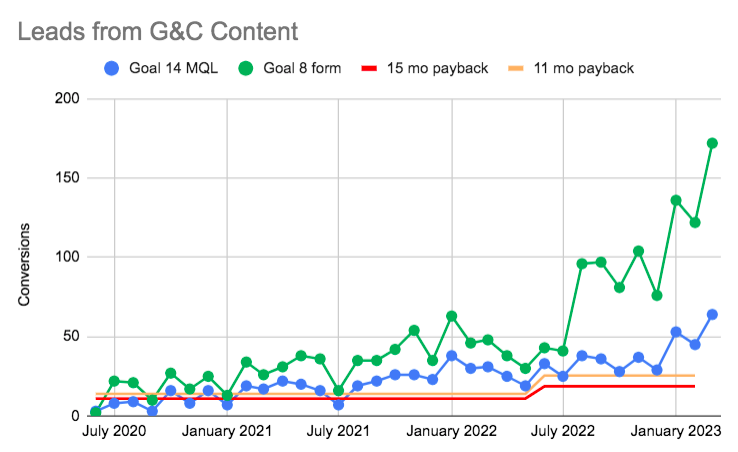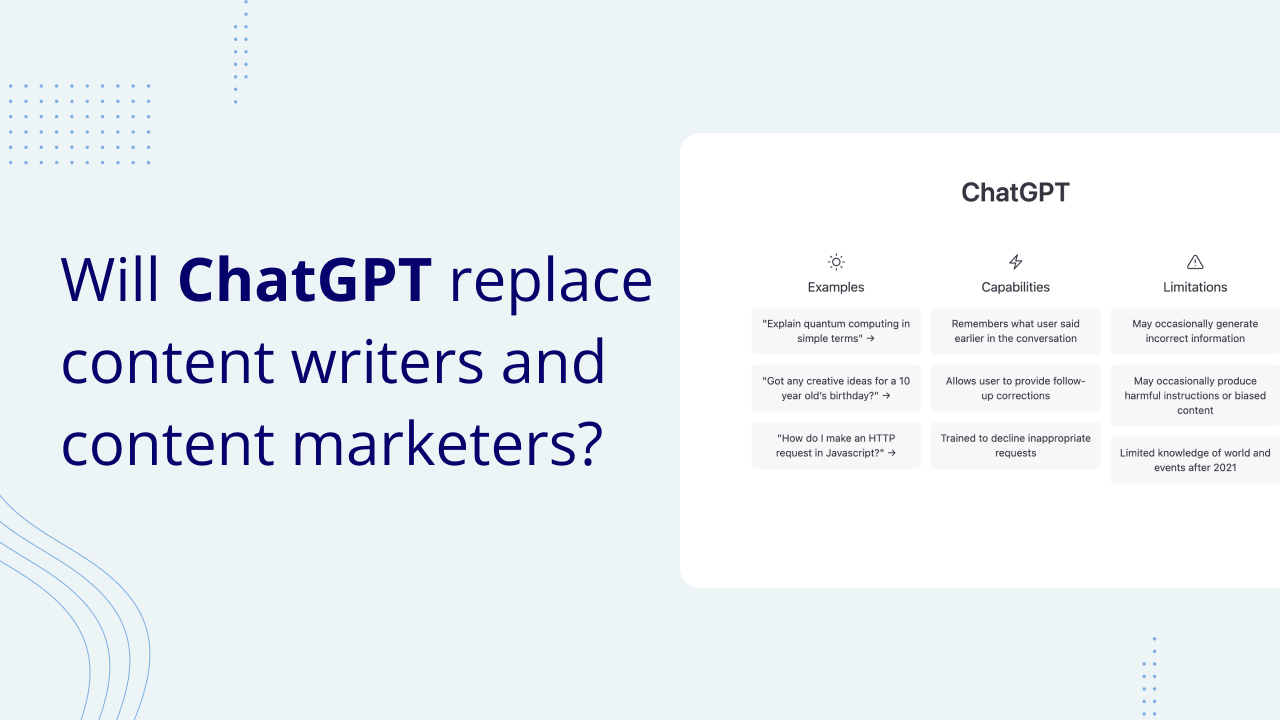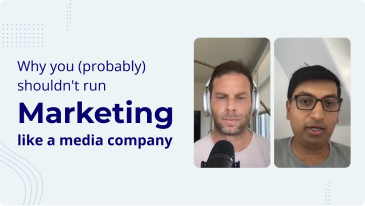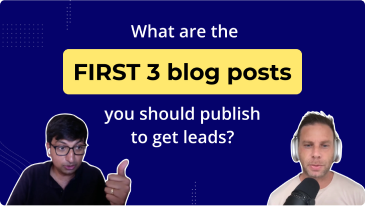When people talk about outsourcing content creation, we’ve noticed they typically fall into one of two buckets:
- Bucket #1: They want to use content as a marketing channel that drives increased traffic, leads, and sales (i.e. what our agency would traditionally refer to as content marketing).
- Bucket #2: They want to use content as more of a thought leadership and brand-building effort, and they’re not as concerned about measuring specific metrics related to business growth. Think: ghostwriting for the CEO, producing interesting story articles to share on social media, etc.
If you’re in bucket #2, what you need is simply a good writer. Specifically, someone who can communicate your perspective and unique ideas in a writing style that matches your brand’s voice. You don’t need to worry about SEO strategy or the various other things that put the “marketing” in “content marketing”.
Now, don’t get us wrong, finding a good writer isn’t easy. We’ve learned this the hard way after filtering through 1000+ writer applicants and testing hundreds of writers over the last seven years running our agency. But we have learned that the key to writer hiring is having a good filtering process.
We’ve written extensively about this in our article on hiring freelance writers. If you’re in bucket #2, read that in addition to our posts on creating a Content Brand and producing thought leadership content. Those pieces will give you a good idea of mistakes to avoid, how to find writers to meet your content needs, and how to do this type of content well.
In this post, we’re going to focus on how to outsource content creation when you’re in bucket #1 and you want to use content as a marketing channel that drives measurable business results.
We’ll cover:
Common Misconceptions About Outsourcing Content Creation
Misconception #1: Hiring a content writer is equivalent to hiring a content marketer
When companies decide they want to invest in content marketing, they often mistakenly think that they just need to hire a writer. But there’s a lot more that goes into content marketing than just the writing.
Specifically, most content marketers make the mistake of producing exclusively top-of-funnel content — the common introductory guide-type posts you’re used to seeing. The problem with this, as we’ve argued in many articles over the years, is that these top-of-funnel articles don’t typically generate conversions and qualified leads.
As a result, we strongly believe the key to good content marketing is content ideation and strategy (often with some focus on search engine optimization). In addition, content marketing also includes understanding content promotion, analytics and attribution, and more. This combination of skill sets is not common in most “writers”, and typically even a “content marketer” is only going to have some portion of these skills.
So, if you’re going to invest in content marketing, it’s essential to understand that hiring a writer alone is not enough. One way or another you need to figure out how to get those other aspects of content marketing into your process.
It could be building that expertise in-house, or finding an agency that has that expertise and puts emphasis on these non-writing aspects of the content marketing process. Specifically, at our agency, there are often 3 to 5 people with different areas of expertise working together on your account. We have SEO strategists, content writers, a PPC specialist, a project manager, and a designer ready to deploy for each client. We could not produce the results that we do for our clients without these teams in place.
Misconception #2: Overemphasis on whether to hire in-house vs. outsource content
Companies often put a lot of emphasis on whether they should outsource or make a full-time hire such as an in-house writer or content marketing manager. But in our opinion, the most important thing to be concerned about is: Does the person or agency you’re considering have a good strategy? Are they a good fit for the type of content you want to do? And do they have a proven track record of driving the type of results you’re looking for?
We can tell you from experience that finding great writers, content strategists, and agencies is hard. So, if you find a good person to run your content marketing in-house, take it. If you find a good agency to do it, take it. It doesn’t actually matter that much whether they’re outsourced or in-house.
Are there some differences between the two? Sure. The main difference from our perspective is that outside agencies will typically have workflows in place to get content production up and running faster. But for a long-term investment like content marketing, this is trivial in comparison to whether or not who you hire is actually good.
Misconception #3: Outsourcing content means you won’t need to be a part of the process
Some companies think that outsourcing content implies you can fully outsource content and not be a part of the process at all. However, while there are agencies and writers out there that will do content for you in this way, this is one of the biggest reasons why companies are regularly dissatisfied with the content they receive from third parties.
If you want to produce high quality content that your brand is actually proud of, that necessitates participating in the content creation process — even just a little bit to give your perspective on the content. Otherwise, how could the writer or agency accurately portray the nuances of your brand’s perspectives on each content topic (not to mention your product or service differentiators, positioning, value props, etc.)?
This is why it’s best to work with writers or agencies that include you in the process. At our agency, we use an interview-based process in which we interview subject matter experts from within our client’s company for each new content topic we write about (more on this below).
Now, with all of this in mind, in the rest of this post, we’re going to walk you through a 5 step process that you can follow to vet content marketers and agencies. This process is equally useful for outsourcing content marketing as it is for hiring someone to join your in-house team.
5 Steps for Vetting Content Marketers and Agencies
Step 1: Decide whether you want content to generate leads, traffic, or something else
Companies have different goals they hope to achieve from content marketing. In our experience, most want leads or sales — whether that be eCommerce purchases, sales call signups, or trials and demos in SaaS. They want measurable ROI out of all their marketing channels, including content. This makes sense.
But there are some, for example, later-stage companies with existing large lead generation numbers, that may want to use content for traffic and email marketing growth. Others just have a vague idea that they want to do content, and may not even realize that this is a choice they can make (i.e. they assume content is solely for getting traffic and brand awareness).
It’s important to understand that this is a choice. You can optimize content around metrics like traffic and email signups (what most digital marketing agencies do), or you can optimize content for generating leads and sales (what our agency does).
If you just want traffic to grow your online presence, it will be much easier to find a content marketer or agency whose strategy aligns with your goal. However, most businesses ultimately want to see ROI from content, which means seeing leads or purchases attributable to content and meaningful increases in revenue over time.
In our experience, this requires a very different content marketing strategy (like the one that we use and have explained at length in previous articles like this and this).
Whatever you decide, the first step is to be explicit with potential candidates about this goal and base the rest of your questions and vetting process around how they’d help you achieve this.
Step 2: Ask them to come up with content ideas and walk you through how the ideas would work to achieve that goal
Once you’ve explained your goal, ask the candidate to come up with content ideas (the #1 most important aspect of content marketing strategy) and explain how those ideas would work to achieve your goal.
If your goal is to drive leads and sales, have them walk you through each content idea and tell you the story of how that piece of content would bring in a new lead or customer.
In our opinion, this story should not be a long multi-step narrative that’s hard to explain. When prospects ask us this on sales calls, we have a very simple explanation: we prioritize content topics that indicate people searching that topic have buying intent for the product or service our client sells.
For example, if our client sells remote executive assistant services, we’re likely going to write about topics such as “best executive assistant services,” “how to hire an executive assistant,” “executive assistant vs. virtual assistant,” and other topics that indicate people are on the market for an executive assistant.
The story of how these topics would bring in new leads or customers is simple. People are either searching on Google for the exact service they offer, or indicating that they’re close to being on the market for that type of service, and we show up with a piece of content that explains:
- The pain points that prospects are likely experiencing
- How our client’s product or service solves those pain points
- How their product or service is different or better than other solutions on the market
This is the type of clear and concise story you should be looking for. This is in contrast to a typical explanation of how top-of-funnel content helps bring in customers that involve multiple conditional steps like a visitor landing, reading, remembering the brand, coming back, maybe downloading an ebook or whitepaper, opening nurture emails, and eventually when they need that product, reaching out.
Remember: The longer the explanation, and the more steps required for the content to achieve your goal, the less likely it is that the content topics the candidate is presenting will get you results.
Step 3: Ask them to explain their content creation process (and how they go about expressing product and domain expertise through content)
Regardless of what your content marketing goal is, it’s important for whoever is producing your content to be able to express domain expertise in a way that feels native to your brand.
This is especially true for B2B businesses whose target audiences are often advanced industry experts who need to be communicated with at an expert level. If you don’t speak to them at their level, you risk reputational damage and turning off potential customers.
Particularly if you choose to optimize your strategy for leads or sales, the topics you’ll write on will be very product or service-centric. As explained in our article on Pain Point Copywriting, this means the person doing your content writing will need in-depth knowledge of your product or service, the nuanced pain points that they solve for customers, and how your product is differentiated from competitors.
Most outside writing services or freelancers will not have this product and domain expertise and therefore need to have a process for getting this information out of the minds of the experts at your company and expressing it through your content.
With that said, what we’ve seen in the market is that many agencies and freelancers end up doing what we call “Google research papers.” Like a high school student doing a research paper, they Google around the topic they were given and regurgitate what everyone else is saying on a given topic.
This results in undifferentiated and generic content. So, particularly if you want to produce conversion-focused content, make sure you ask them:
- What is their process for being able to write and convey your value props, benefits, messaging, and differentiators in a way that feels native to your brand?
- Do they even have one? And if so, how does it work?
Is it a one-off interview at the beginning of the engagement? Is it a few one-hour calls? Do they regularly interview experts at your company on a piece-by-piece basis?
We have found the latter approach — doing interviews on a piece-by-piece basis — to be extremely rare when working with outside agencies, yet the most effective approach for expressing product and domain expertise through content. This is the approach we take at our agency, as we’ve demonstrated in this in-depth case study.
Step 4: Ask them how they would drive traffic to your content (i.e. What’s their process for content promotion?)
For content marketing to work, someone needs to drive traffic to your articles. So, another key thing to understand is what the candidate offers with regard to content promotion. Is it included in their service? Sold separately? And what exactly do they do?
For example, do they just share the content they write via your own brand’s social media marketing channels (tweet it out for you, share it on your LinkedIn page, etc.)? Because that’s something you could easily do yourself.
Or, if they rely strictly on SEO, is there anything they do in the short term to help drive traffic to articles during the time it takes for them to rank? Or do they help build links to speed up rankings?
This is a key issue to address because what an agency offers for promotion will determine how much you’ll need to do on your end to drive traffic to your articles.
At Grow and Convert, we use a two-pronged promotion strategy to drive both short and long-term traffic to your articles as we wait for them to rank in Google. Specifically, we use paid ads to drive short-term traffic and conversions to content, and manual link building to support SEO rankings which drive long-term organic traffic that grows over time.
We do all of the above from our budget, with no extra spend for our clients, making us a truly full-service agency. This is markedly different from other content marketing agencies and something we’re very proud of offering our clients.
Step 5: Ask them to explain how they measure and report on results
Finally, it’s important to ensure that whoever you hire has a way to track and report on metrics that align with the goal of your content initiatives.
Most commonly, companies and agencies track and report on traffic, keyword rankings, and email marketing signups. Fewer track and report on conversions from content, despite conversions being the key metric that most companies actually want to drive from their content efforts.
At Grow and Convert, we track and report on the following for our clients:
- Conversions: We track and report on conversions using the Model Comparison Tool in Google Analytics.
- Keyword rankings: We use Ahrefs rank tracker to monitor rankings progress for each article’s target keyword.
- Overall pageviews and organic traffic: We set up traffic dashboards in Looker Studio that measure overall pageviews and organic traffic to our articles.
In tracking multiple metrics, particularly keyword rankings and conversions, we’re able to double down on the topics that produce the best results for our clients.
How Much Does It Cost to Outsource Content Creation?
A natural question that companies have when considering outsourcing content is: how much does this cost? And how would the cost compare to hiring someone in-house?
The answer to these questions will vary depending on your business context. For example, do you have some resources to manage parts of the content marketing process in-house, and just need a writer to write the content? Or do you need someone to do your entire content marketing strategy, keyword research, content interviews, writing, etc.? Obviously, the latter is going to cost significantly more.
In terms of ballpark numbers, if you’re hiring just a content writer, our stance is you shouldn’t pay less than $200 per piece of content. In our experience, we thought professional writers charging high rates would be really good, but that hasn’t been the case. We’ve paid more than $1,000 for a piece that we weren’t able to publish. Grow and Convert writers get paid $500 per article, and we have pretty high standards for content quality.
If you’re looking to hire someone to run content marketing for you more broadly, including strategy, writing, promotion, and measuring results, this cost would be more akin to hiring a full-time team member that also hires contractors such as writers, designers, and developers to execute your content marketing.
In terms of how much you should expect to spend, it’s not going to cost you $50k per month, nor is it going to cost you $200 per month. Depending on what the makeup of your team looks like, you should expect to spend somewhere in the mid to high thousands per month. The most popular plan for our SEO content marketing agency, for example, is $10,000 per month.
How We Hold Ourselves Accountable
For every one of our clients, we create an ROI graph like this one (a live graph from a B2B SaaS client we’ve been working with for over 2 years):

Each month, we plot the number of leads from our articles on this graph (green being a particular product signup metric and blue being another one further down the funnel). The red and orange horizontal lines represent the number of leads this client needs per month to break even on their monthly spend with us. This lets us and the client see progress in relation to that break-even number, so clients can see when they begin to have positive ROI.
We’ve written extensively about how we do this here and here, including more case studies and client data. Before we started our agency, this is the type of thing we were looking for but could never find. And we feel this is the number one differentiator of our agency.
Learn More About Our SEO and Content Marketing Agency
- Our Agency: If you want to hire us to execute a content marketing strategy built around driving lead generation and sales, not just traffic, you can learn more about our service and pricing here. We also offer a PPC service for paid search, which you can learn about here.
- Join Our Content Team: If you’re a content marketer or writer and would love to do content marketing in this way, we’d love to have you apply to join our team.
- Our Content Marketing Course: Individuals looking to learn our agency’s content strategy and become better marketers, consultants, or business owners can join our private course and community, taught via case studies, and presented in both written and video content formats. We include several details and examples not found on this blog. Our course is also built into a community, so people ask questions, start discussions, and share their work in the lesson pages themselves, and we, along with other members, give feedback. Learn more here.








